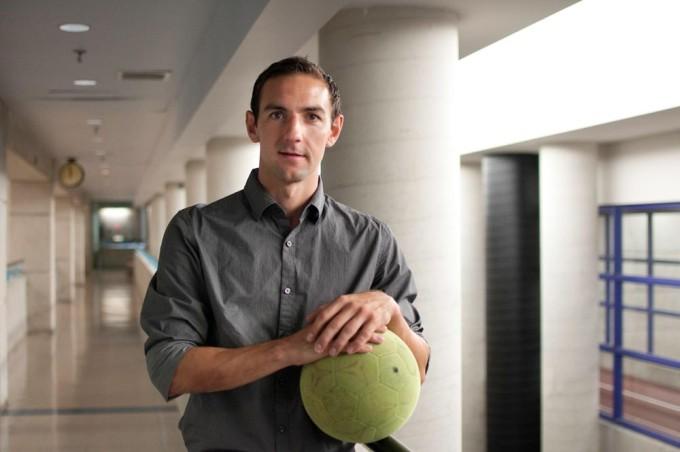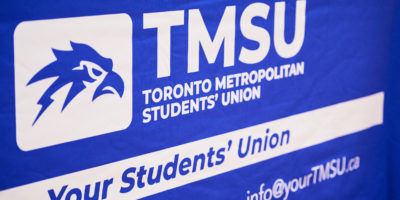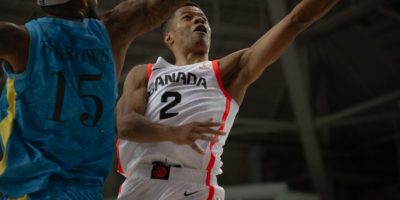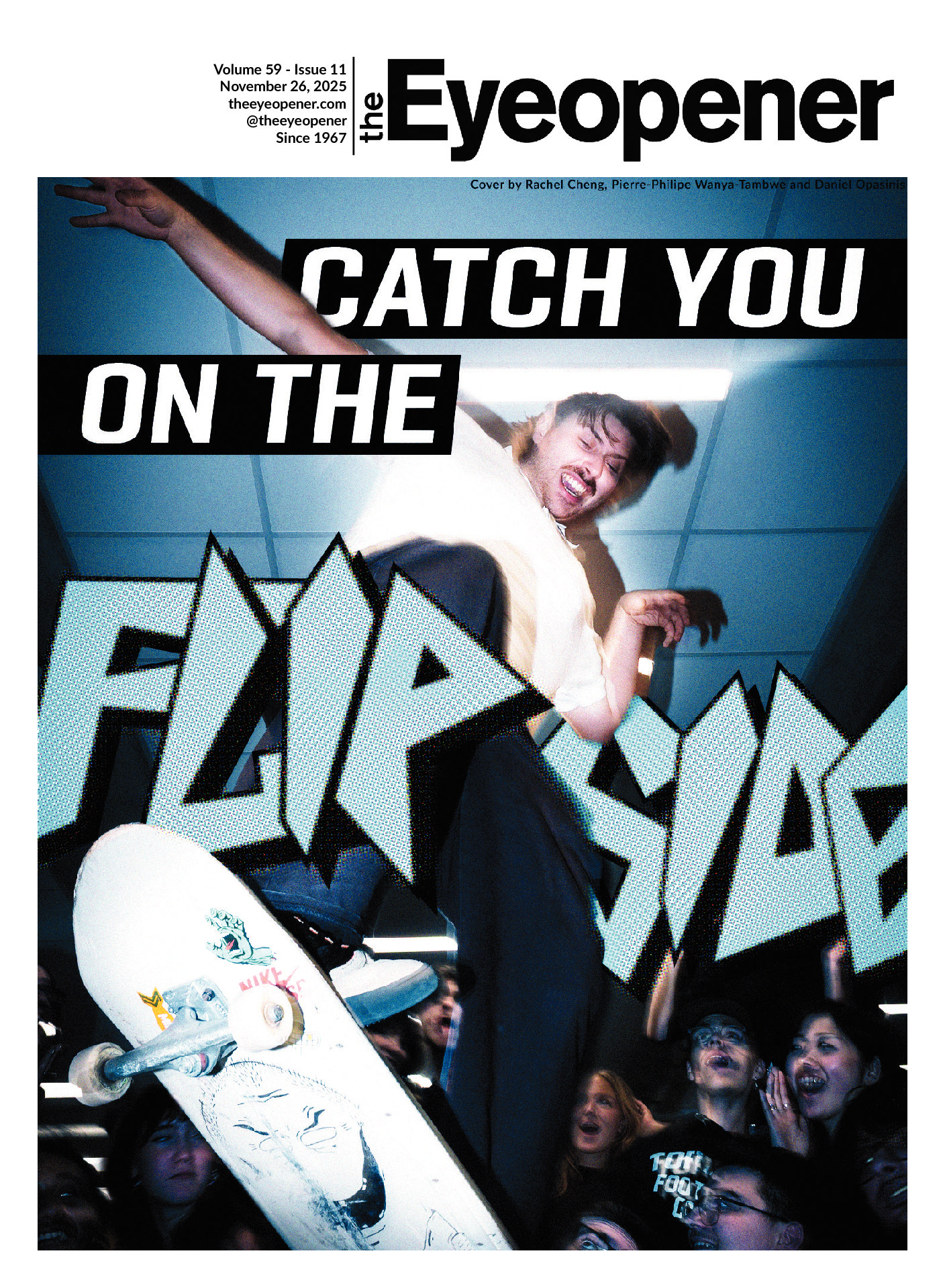By Josh Beneteau
Last week the Ryerson women’s soccer coach, Kevin Souter, stepped down after four years on the job. The 31-year-old will be moving back to his home country of Scotland later this year with his wife and daughter to be closer to his family. The Eyeopener talked to him about his time at Ryerson and what the future holds.
Q: Why did you choose now to step away from the team?
A: Well for me I’ve been with Ryerson now for five years. I didn’t think five years ago I didn’t think I would be here beyond five, six, seven years. I knew that there was an opportunity to develop as a coach and move on.
But the decision came mainly back in the holidays. I went home to Scotland with my wife and daughter and it was nice to be home. It was nice to be with family. We have lots and lots of support that we don’t have here. Everyone is just busy and that’s just the North American lifestyle.
From a family perspective, I felt I needed to step away time, to give more to my wife and daughter then I currently am. In all fairness I can’t give everything to either my family or the team and I was kind of caught in the middle. So it’s time I think for the team to progress, I think they need somebody who can give everything. There is a bit of a growing process over the next couple seasons and it’s going to take a little bit of time. So I think someone is best taking that on now as opposed to waiting another year before deciding to leave.
Q: So you started thinking about this decision around Christmas?
A: I’ve been thinking about it a lot. At Christmas when I went home, I lost my grandfather so there was a lot of family around at the time, which gave me a chance to reflect on his life. He was a big part of my life and a big inspiration to me. It wasn’t like he changed the world in any grand way but he was just a very genuine person who cared about family, friends and that part of life.
I looked at what I’m doing, and I love coaching by all means, but in this environment with a young family the biggest challenge for me was commuting two hours every day to downtown Toronto from Bolton. It’s two hours back to Bolton as well, so that’s four hours of my day I don’t get to see my family. I don’t get to work either, because I’m sitting in a car, so that was a really turning point for me. I realized mentally and emotionally I was becoming more detached from soccer and it was time to move on and let someone else take on the challenge.
Q: Do you have a soccer job lined up in Scotland?
A: The decision was to move back for family, but I do have a few opportunities. My personal goal is to get involved with a youth academy. I used to play in Aberdeen in Scotland, so I’ve talked to the youth academy director there and at some point I’d like to get involved with a club at the professional level. I also have the opportunity to play. I played there [In Aberdeen] ten years ago with a semi-professional team and I’ve got a few offers already with clubs interested.
They’re actually offering me various jobs on the side. I’ve actually got an opportunity to coach an under 20 team, so the good thing about Scotland is that there’s lots of family, friends, and contacts so getting work won’t be a big problem. Getting work won’t be a big problem, it’s just about deciding where I want to coach, at what level I want to coach and what my future goals are.
Q: How would you describe your time spent at Ryerson?
A: I think the team evolved as I did. I was young coach who came in with a lot of playing experience and as a winner in many ways. As a young coach I continued to learn and what I learned was that experience and culture building weren’t necessarily things that played into Xs and Os on a tactics board. Those were the things that I learned over time and those are the things the team is starting to grasp as well.
My first season I came in, took over in [2011] and we went to the playoffs. We had a certain record that we hadn’t had in the past: Most goals scored, most goals accumulated in a season. [In] 2012 and 2013 we didn’t do so good although the comments from other coaches around the OUA was that this team wasn’t so far off and that you could see the level of play improve, we starting to cause some headaches for other teams, despite us not making playoffs
Then this final season, we started off slow, we had a young team and kind of reverted back to fundamentals and basics and defensive work and we started to get some results. Despite missing playoffs by one point, it was in our hands. We took it from being out of our hands, to it being in our hands. We had to play in Laurentian away from home, against a team we hadn’t beaten, on a grass field. So it was just mud, a scrap and we lost on a breakaway counter-attack 1-0. I thought, to be honest, that we were the better team, it just didn’t fall for us and that’s how I’d categorize my time at Ryerson. I’ve seen a lot of development and a lot of hard work put in but we haven’t seen results on the field.
So its time someone else take that on and that experience and get going and get the results team actually deserves over these past couple seasons
Q: Why do you think the team was never able to get the wins in your time as the women’s coach?
A: Well, I think for a number of reasons and that’s the beauty of reflection. I wasn’t really being true to myself. As a player I was a winner, as a captain I was a winner. I had a certain expectation and mentality, with what I did and what I expected from my teammates. That didn’t translate to me with being a coach, yet.
I felt like that I allowed things to go. I didn’t have the same high standards as I did as a player. And it’s a hard thing because I was coaching females which was a first for me. So that was all again, in hindsight, a learning curve because at the time I was trying to figure it out with my head against the wall. So that’s what I wasn’t doing, what I wasn’t communicating and what they weren’t getting.
What I did realize is that this year, what we did do after consulting with Ivan Joseph, my mentor coach, we literally just took away the ability to play. And we said we are going to defend and we are going to counter-attack balls and we’re just going to work hard. And to be honest, that unattractive style of soccer, which goes against my philosophy as a player, worked at this level.
The other thing I find that personality wise, you have to have the right personalities. Although I was recruiting talent, not always did the personalities match my own. And that was something I think I can look back at over time and think that the players that were really successful in our program were the ones who matched the personality on the field that I had.
And again all of this is in hindsight because I didn’t really look at it hard enough. I saw ability, potential and skill but there was something missing. We weren’t getting the results. And we needed that something to win games.
Q: You mentioned Ivan. He was actually on the sidelines for a few of the games later in the season. Can you explain how that relationship worked?
A: Ivan’s always been a mentor of mine for many years and he was always been behind the scenes giving advice. And he was with the men’s team doing much of the work there. But this season we started slow and again because the OUA is difficult, because we don’t have a lot of time preseason, and because we don’t have our own soccer field, which is a huge minus especially for the women’s program. So we didn’t get to work on a lot of the concepts we wanted to [in the] preseason and we came in to this season conceding soft goals.
And before you know if, two to three weeks go by and we’ve played six or seven games and half the season is done.
So I sat down with Ivan and said ‘look, we need to turn this around and that we need your help. I want you to come stand on the sidelines and let me know what you see. I want you to come to practice and let me know what you see.’ Because I think I was too close and too involved and I needed another perspective.
And so he came over and we sat down and we would discuss things on the bench and we would discuss things pre and post practice. Personal qualities and other things we were going to look and the things we were going to do to get results by the end of the season over the short-term.
So to me he was a huge help coming in. And we beat Queen’s, overcoming a 2-1 deficit to win 3-2 when they were nationally ranked at the time. And we also beat UOIT (University of Ontario Institute of Technology) who were also nationally ranked.
Q: What is your biggest regret from your time at Ryerson?
A: That’s a tough one. If I was to go way back to the start, part of me would have said to spend more time under Ivan as an assistant coach. Not to learn necessarily the soccer side, that’s something I feel fairly confident in. But [to learn] the culture building aspect. And I say that because the environment we have at Ryerson is extremely difficult and unique.
We’re a commuter campus with no field. The players that we do have don’t necessarily rely on us as an extended parental support or network. They go home to their families each night. Everything is with in touching distance when you get to downtown Toronto as a lure right there. That’s a very different culture building than what I was used to, in a small campus with international students who were thousands of miles away from their families and all you had were each other.
So I would say I would have probably spent more behind the scenes getting to grips with culture building in an urban campus with the challenges that we have in order to lay that foundation so then I could go and put in my technical and tactical stamp on the team.
Q: Are you going to be involved in selecting the next coach?
A: No not at all. I think it’s important that over the past four years, I have been able to lay a certain foundation within the team. We’re within touching distance and with a couple players, the gap isn’t really that big. With the right couple players and maybe the right tactics and the right mentality, that the new coach can create, I could see this team moving on significantly. I don’t think it’s going to take a whole lot.
But we’ve started a process as a coaching staff. And I think it’s important that I sever ties at this point and allow the department to hire someone that they feel is going to take this team to the next level.











Leave a Reply